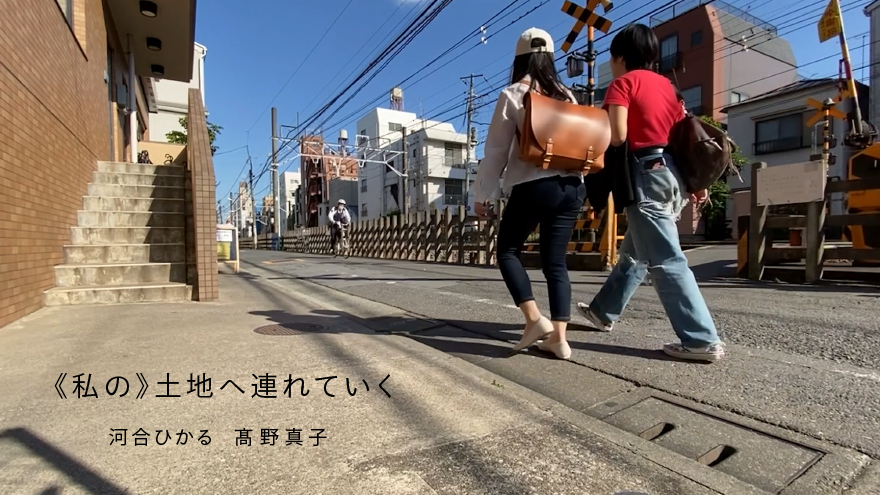スクリーン
2023.06.01 UP
【SHOWCASE in the Screen】#21_2. 河合ひかる / 高野真子 Hikaru Kawai / Mako Takano〈《私》の土地に連れていく I will take you to [my] land〉

SHOWCASE in the Screen
2023.5.30ー6.16
#21_2. 河合ひかる / 高野真子 Hikaru Kawai / Mako Takano〈《私》の土地に連れていく I will take you to [my] land〉
2023年、映像、15分
2023, Video, 15min.
[コンセプト Concept]
日本では、当たり前のように生まれに無関係な「本籍」を基準地として「氏」を同じくする家族を 単位として編製される戸籍制度があり、子が産まれると父母どちらかの本籍地に入れる。そし て、また居住地とも出所地でも無い何処かの墓地や霊廟に入り、生より長い時間をそこで眠る。 それを血縁で結ばれた者が管理するのが、いわゆるお決まりだ。どちらも血統主義の家族制度 の中で作られたものであり、それは血縁外との境界を強固に引く行為でもある。 このように制度的に、あるいは記号的に、私たちの生と死は土地に結びつけられている。そこで 河合は、出生地でも居住地でもない、まだ見ぬ本籍地に高野を連れていく。
一方で高野は、自分 が入るかもしれない高野家の墓へ河合を連れていく。 2人の止まらないゆるやかな対話によって、浮かび上がってくるのは日本における血統主義的 な文化であり、それらは今も境線を引き続けている。しかし、血縁的な先祖より隣に居る他人の 方が、どうして考えを共有出来るのだろう。そんな時、見ず知らずのあなたでも同じ時と同じ土地 を踏んだ時、それは私の土地になる。 この作品では、2人の血縁的所縁のある土地へ行き、そこで会話を交差させる事で語りを共有 し、このプロセスを映像として提示する。互いの境界をときほぐす試みをしたい。
In Japan, the family registration system is based on a "family register," unrelated to the place of birth, and it is made up of family members who share the same "family name". When they pass away, he or she is placed in a cemetery or mausoleum somewhere, which is neither the place of residence nor the place of origin, where he or she will rest for a longer period of time than during his or her lifetime. The so-called rule is that those who are related by blood manage it. Both are created within the pedigree-based family system, which is also an act of drawing firm boundaries with those outside the bloodline. Thus, institutionally or symbolically speaking, our life and death are tied to the land. So Kawai takes Takano to a place that is neither her place of birth nor her place of residence, a place of origin that she has yet to see.
What emerges from their unstoppable, slow dialogue is the pedigree-based culture of Japan, which continues to draw boundaries even today. But how is it possible that a stranger next to you can share your thoughts with you rather than your blood ancestors? At such times, when even you, a stranger, step on the same time and the same land, it becomes my land. In this work, I go to the land where two people are related by blood, and share a narrative by crossing conversations there, and present this process as a video. We would like to attempt to untangle the boundaries between the two of us.
[作家について About the Artist]
河合ひかる
1999年生まれ。武蔵野美術大学造形学部油絵学科卒業。日本と中国にルーツをもち、幼少期より実際にコミュニケーションを取ることができる家族は皆、中国籍であり中国語話者であった。このような生い立ちの中での個人的体験を基に、言語やコミュニケーションといったテーマを、映像やインスタレーションを用いて詩的に表現している。
髙野真子
1999年生まれ。東京藝術大学先端芸術表現科卒業。自身の子宮内膜症をきっかけに、生命倫理の問題を考え、映像作品を制作している。現在は、ヒトだけではなく、様々な命あるものに対して目を向け、多様な死生観について考え制作を続けている。
Hikaru Kawai
Born in 1999. Graduated with a BA from the Department of Oil Painting, Musashino Art University. With roots in Japan and China, she has been able to communicate with her family since childhood, all of whom were Chinese citizens and speakers of Chinese. Based on her personal experiences in this upbringing, she poetically expresses themes such as language and communication using video and installation.
Mako Takano
Born in 1999. Graduated with a BA from the Department of Inter Media Art, Tokyo University of the Arts. She has been creating video works considering the issue of bioethics after suffering from endometriosis. Currently, she continues to produce works that consider various views of life and death, focusing not only on humans, but also on various other living things.
2023.5.30ー6.16
#21_2. 河合ひかる / 高野真子 Hikaru Kawai / Mako Takano〈《私》の土地に連れていく I will take you to [my] land〉
2023年、映像、15分
2023, Video, 15min.
[コンセプト Concept]
日本では、当たり前のように生まれに無関係な「本籍」を基準地として「氏」を同じくする家族を 単位として編製される戸籍制度があり、子が産まれると父母どちらかの本籍地に入れる。そし て、また居住地とも出所地でも無い何処かの墓地や霊廟に入り、生より長い時間をそこで眠る。 それを血縁で結ばれた者が管理するのが、いわゆるお決まりだ。どちらも血統主義の家族制度 の中で作られたものであり、それは血縁外との境界を強固に引く行為でもある。 このように制度的に、あるいは記号的に、私たちの生と死は土地に結びつけられている。そこで 河合は、出生地でも居住地でもない、まだ見ぬ本籍地に高野を連れていく。
一方で高野は、自分 が入るかもしれない高野家の墓へ河合を連れていく。 2人の止まらないゆるやかな対話によって、浮かび上がってくるのは日本における血統主義的 な文化であり、それらは今も境線を引き続けている。しかし、血縁的な先祖より隣に居る他人の 方が、どうして考えを共有出来るのだろう。そんな時、見ず知らずのあなたでも同じ時と同じ土地 を踏んだ時、それは私の土地になる。 この作品では、2人の血縁的所縁のある土地へ行き、そこで会話を交差させる事で語りを共有 し、このプロセスを映像として提示する。互いの境界をときほぐす試みをしたい。
In Japan, the family registration system is based on a "family register," unrelated to the place of birth, and it is made up of family members who share the same "family name". When they pass away, he or she is placed in a cemetery or mausoleum somewhere, which is neither the place of residence nor the place of origin, where he or she will rest for a longer period of time than during his or her lifetime. The so-called rule is that those who are related by blood manage it. Both are created within the pedigree-based family system, which is also an act of drawing firm boundaries with those outside the bloodline. Thus, institutionally or symbolically speaking, our life and death are tied to the land. So Kawai takes Takano to a place that is neither her place of birth nor her place of residence, a place of origin that she has yet to see.
What emerges from their unstoppable, slow dialogue is the pedigree-based culture of Japan, which continues to draw boundaries even today. But how is it possible that a stranger next to you can share your thoughts with you rather than your blood ancestors? At such times, when even you, a stranger, step on the same time and the same land, it becomes my land. In this work, I go to the land where two people are related by blood, and share a narrative by crossing conversations there, and present this process as a video. We would like to attempt to untangle the boundaries between the two of us.
[作家について About the Artist]
河合ひかる
1999年生まれ。武蔵野美術大学造形学部油絵学科卒業。日本と中国にルーツをもち、幼少期より実際にコミュニケーションを取ることができる家族は皆、中国籍であり中国語話者であった。このような生い立ちの中での個人的体験を基に、言語やコミュニケーションといったテーマを、映像やインスタレーションを用いて詩的に表現している。
髙野真子
1999年生まれ。東京藝術大学先端芸術表現科卒業。自身の子宮内膜症をきっかけに、生命倫理の問題を考え、映像作品を制作している。現在は、ヒトだけではなく、様々な命あるものに対して目を向け、多様な死生観について考え制作を続けている。
Hikaru Kawai
Born in 1999. Graduated with a BA from the Department of Oil Painting, Musashino Art University. With roots in Japan and China, she has been able to communicate with her family since childhood, all of whom were Chinese citizens and speakers of Chinese. Based on her personal experiences in this upbringing, she poetically expresses themes such as language and communication using video and installation.
Mako Takano
Born in 1999. Graduated with a BA from the Department of Inter Media Art, Tokyo University of the Arts. She has been creating video works considering the issue of bioethics after suffering from endometriosis. Currently, she continues to produce works that consider various views of life and death, focusing not only on humans, but also on various other living things.